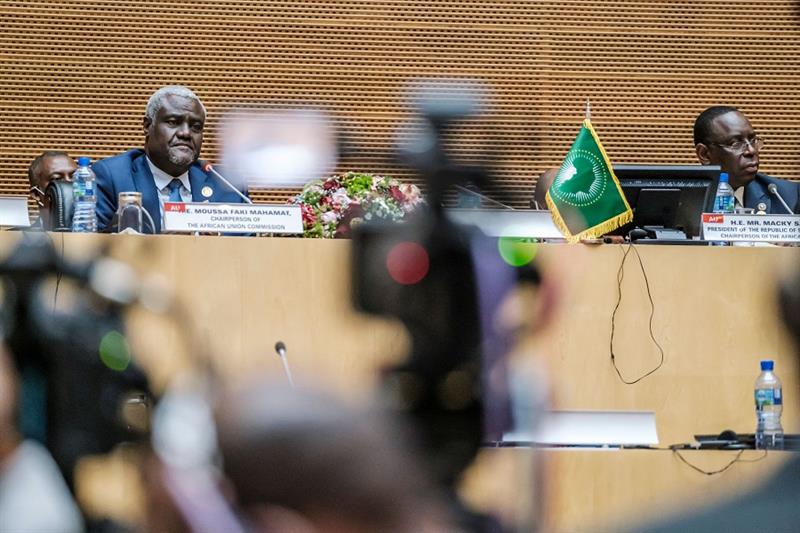
Moussa Faki Mahamat (L), African Union Commission (AUC) Chairperson, and Macky Sall (R), Senegal s President and Chairperson of the African Union, address the press during the closing session of the 35th ordinary summit of the organization, in the city of Addis Ababa, Ethiopia, on February 06, 2022. AFP
Key issues:
Vaccines
The European Union is under fire for its response to the coronavirus pandemic -- the accusation is that it has hoarded vaccines that could have helped Africa better protect itself.
The EU; the world's biggest vaccine exporter , has been criticised for prioritising shipments to richer nations.
It has also drawn ire for blocking an African-backed push for an intellectual property waiver to allow the generic production of Covid-19 vaccines.
The EU points to more 400 million jabs it has contributed to the global Covax vaccine-sharing initiative and its promise to provide Africa some 450 million doses by mid-2022.
Europe is now looking to increase funding to help health systems on the continent get jabs into arms. It has pledged one billion euros ($1.13 billion) to bolster future vaccine production in Africa.
Investment
Europe is hoping that the promise of sorely needed investments can turn it into Africa's "partner of choice" and provide an alternative to cheap Chinese loans that, critics say, can become a debt trap.
Ahead of the summit, European Union chief Ursula von der Leyen outlined ambitions to mobilise investment of more than 150 billion euros ($170 billion) for Africa by 2027.
The scheme is the first regional part of the EU's Global Gateway, a $300-billion-euro worldwide investment blueprint meant to rival Beijing's Belt and Road initiative.
The plan aims to marshall funding, much of which has already been announced from EU institutions, member countries and the private sector.
It will go towards priorities including renewable energy, internet access, health and education.
But EU member states were still haggling over how much should be committed to an infrastructure investment package scheduled to be announced at the summit.
And EU nations are facing calls to give Africa a larger share of their post-Covid recovery boosts from the International Monetary Fund (IMF) after lagging behind China.
Instability
The summit comes after a wave of military coups in Africa that have seen an unprecedented number of member states suspended from the African Union.
Burkina Faso last month joined Guinea, Mali and Sudan as the fourth country frozen out by the AU and the West African regional bloc ECOWAS after disgruntled soldiers toppled the elected president.
Those four will not be represented in Brussels.
African leaders have complained the power grabs give the impression the continent is going backwards, while the putsches have been condemned by the EU keen on democratic reforms.
The continent is also grappling with a brutal conflict in Ethiopia, a political standoff in violence-wracked Libya and a powerful Islamist insurgency in the Sahel.
Mercenaries
Europe is unsettled by the rising clout of Russian mercenaries in some of Africa's most volatile hotspots.
Shadowy paramilitary outfit Wagner, alleged to have close ties to the Kremlin, is accused of bolstering Moscow's geopolitical ambitions.
Western nations have condemned the reported arrival of its mercenaries in Mali's capital Bamako to help protect a junta that seized power last year. Mali's rulers deny hiring Wagner.
France, which has been fighting jihadists in the Sahel since 2013 -- accuses Wagner of "despoiling" the country's resources, and the EU targeted the group with sanctions in December.
Europe's anger has cast a dark shadow over the future of an EU military training mission in Mali. The bloc has already suspended a similar programme in Central African Republic over Wagner's presence.
Migration
Trying to regulate the flow of illegal migrants risking the perilous journey to Europe remains a major concern for EU leaders sensitive to domestic criticism.
Brussels is keen to see African countries take back more people facing repatriation and is looking to muster more funds to fight traffickers.
The EU last week offered to deploy its border agency to Senegal to help combat migrant smuggling, following a surge in crossings to Spain's Canary Islands.
There has been a sharp jump in attempts to reach the Canary Islands -- a gateway to the EU -- as authorities have clamped down on crossings to Europe from Libya.
Short link: